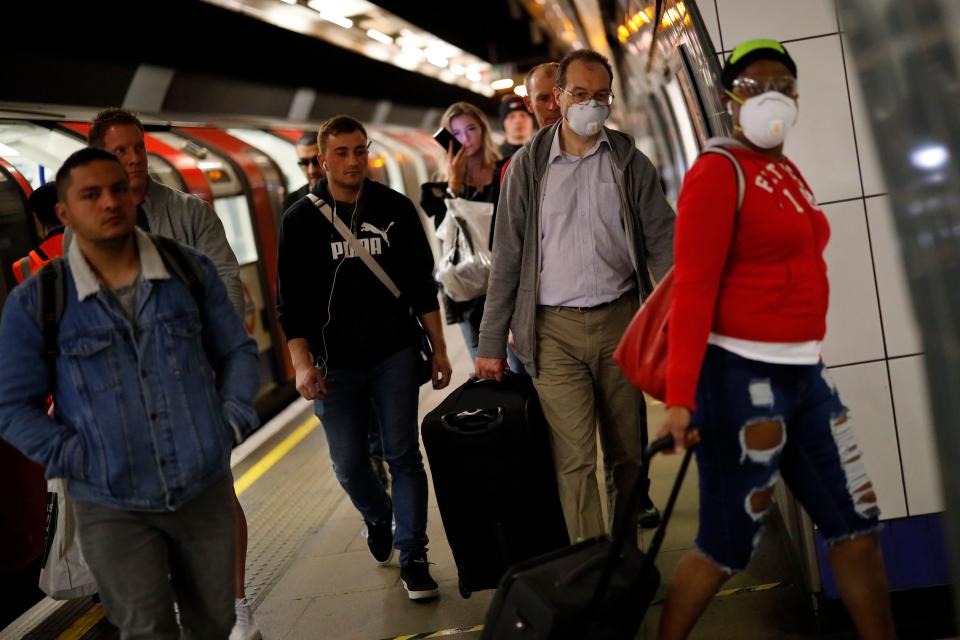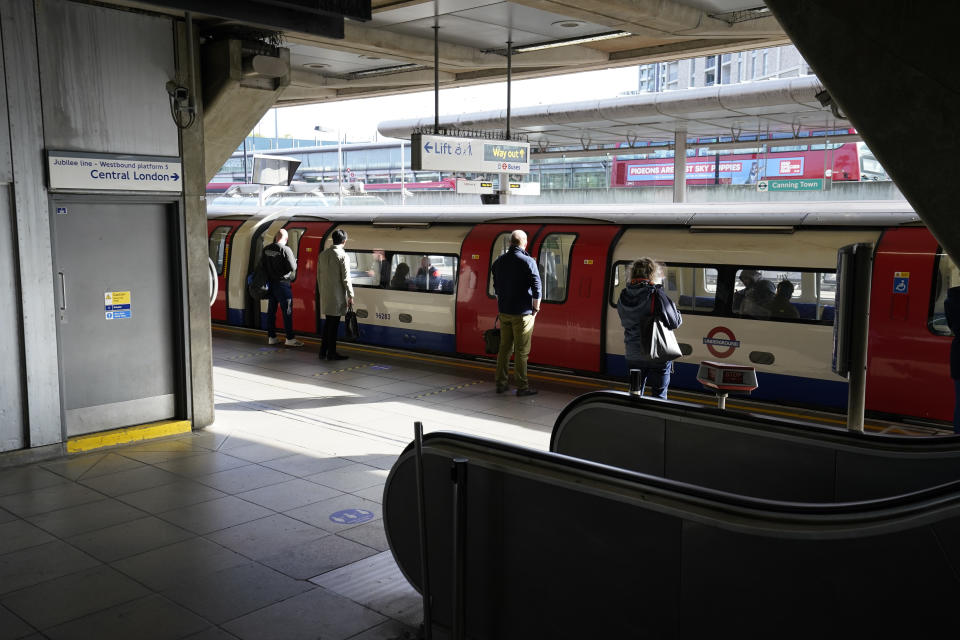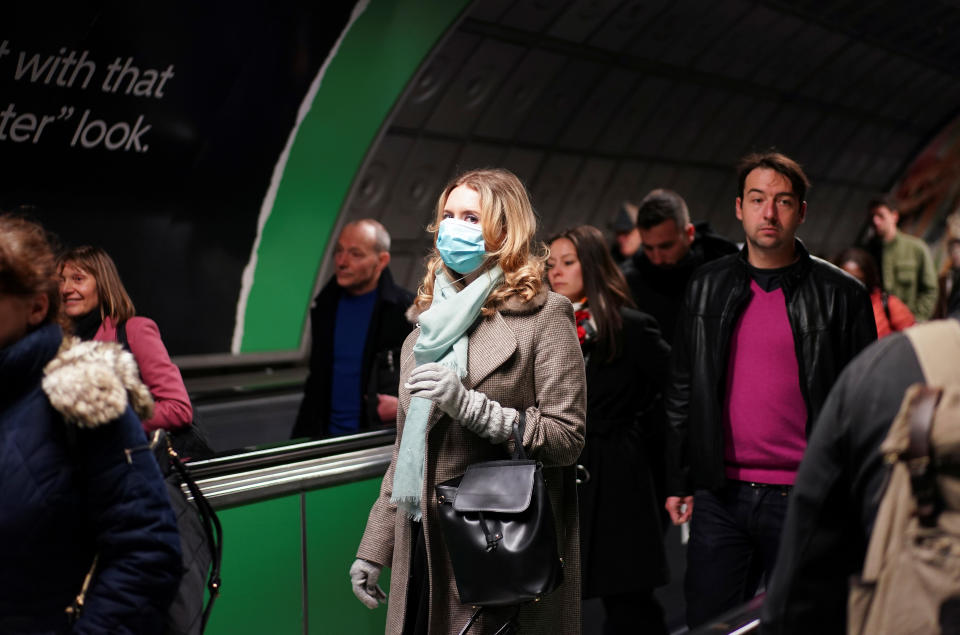Workers pack Tube and road traffic rises by 20% after lockdown rules ease working from home
Britain's roads saw an increase in weekly traffic on Monday as amended coronavirus lockdown rules meant some workers could return to their jobs.
Commuters took to roads and public transport networks after Boris Johnson advised those who need to return to working away from home to do so, in a public address on Sunday night.
Congestion on major roads such as the M25 was reported for the first time since the UK entered lockdown on 23 March.
Data published by location technology firm TomTom showed that the level of road congestion in London at 8am was 20%, up from 16% a week earlier.

Pictures of rush-hour trains packed with workers and crammed buses flooded social media, despite Johnson urging people to avoid public transport and instead walk or cycle to work.
In his address on Sunday night, the prime minister said: “You should avoid public transport if at all possible – because we must and will maintain social distancing, and capacity will therefore be limited.”
NEW: Very busy on the early tube - this was Jubilee line first thing. Then commuters tell me it eased but noticeably busier than last week with more construction / office workers. Complaints many not wearing masks. (DMs open & confidential) pic.twitter.com/p8O1tDGhbH
— Tom Edwards (@BBCTomEdwards) May 11, 2020
His directions came under fire immediately.
Labour's shadow business secretary Ed Miliband said: “The prime minister said he wanted workers to avoid public transport and use cars, bicycles or walk to work but did not explain how. What if none of those are viable options?”
Labour leader Sir Keir Starmer said Johnson’s announcement lacked “clarity and consensus” and that he was “effectively telling millions of people to go back to work tomorrow” without clear guidelines.
#StayAlert #londonunderground pic.twitter.com/8kOAffUTYr
— Mikey T (@Thisismkt) May 11, 2020
Rush-hour commuters 'nervous' about return to work
Despite the increased footfall, passenger numbers remained comparatively low at Waterloo station – normally one of London’s busiest – during Monday morning’s rush hour, with only a few dozen walking through the main concourse at any one time.
Commuter Gerry Tiernan, 54, was travelling to Canning Town from Brentford. She said: “I am surprised at the amount of people who aren’t wearing masks at the moment.
“It has been great travelling when no-one is around, but it is going to get busier now. It’s going to be pure luck as to whether you get it [COVID-19] or not.
“There are signs on the Tube saying ‘Keep two metres apart’ but no one is doing it. When there are more people, it is going to be terrible.”

Doctor James Wilson, 29, works at West Middlesex Hospital in Isleworth. He said he was “very nervous” about how his commute will change over the coming weeks.
“Based on what we have been seeing in London over the past few weeks about some people not following the rules, I am not sure they will follow the two-metre distancing rule when travelling,” he said.
“We have only just got past the peak [of the virus] and I think we need to see a longer period of things being sustained at this level. If we stop social distancing, we are going to see it back in three weeks.”
Peter Osu, 45, said he was returning to work at a construction site for the first time since the lockdown started.
Speaking at Waterloo station, where every other bench is taped off to prevent people sitting next to each other, he said: “I am nervous about going back because I have a family and they have been isolating since the start. I feel like I am now putting them at risk.
“People were sitting close together on the Jubilee line [on the Tube] and others were having to stand. There was no two-metre spacing. This is the first day, can you imagine what it’s going to look like by the end of the week?
“It is not right at all. I listened to the prime minister yesterday and I thought it does not make sense.”
Latest coronavirus news, updates and advice
Live: Follow all the latest updates from the UK and around the world
Fact-checker: The number of COVID-19 cases in your local area
6 charts and maps that explain how coronavirus is spreading
Mayor of London Sadiq Khan warned today that the effects of coronavirus on public transport would be long-term.
In a statement sent to Yahoo News UK, he said: “Coronavirus has had a profound impact on public transport in London and will continue to do so long into the future.
“All public transport providers face huge challenges around social distancing – with the number of passengers TfL can safely accommodate on Tubes and buses reduced by over 85%.
“We will all have to continue playing our part in reducing demand on services by working from home if we possibly can. Please avoid public transport wherever possible.”
The mayor urged Londoners to rethink the way they commute and avoid travelling during peak times, and to wear non-medical masks and carry hand sanitisers.

He added: “By rapidly rolling out more space for walking and cycling through our London Streetspace plan we are enabling many more journeys to be made through these sustainable means which is crucial to our city’s recovery.
“I am pleased that all TfL frontline staff will be offered basic face masks from today. Along with the introduction of hand sanitiser points in the coming weeks, these additional measures will further protect our heroic staff and passengers at this critical period.”
London’s transport commissioner Mike Brown said the future of transport in London would be very different to what travellers had become used to.
He said: “Our intention is to progressively build up service levels to as close to pre-pandemic levels as possible, but it is clear life simply won’t be swiftly returning to what it was before.
“The travel demand challenge facing us outstrips that faced during the 2012 games due to the national requirement to maintain two metres distance between passengers wherever possible. That may not always be possible of course, given the design of London’s transport network.”
Brown reiterated Khan’s appeal for protective masks to be worn in public.
“Please use facial coverings for any travel on public transport or if using taxi and private hire services,” he said.
A spokesman for TfL said Tube travel in London had dropped by 95% and bus travel by 85% during lockdown – meaning low levels of travel on the Tube not seen in over 100 years.
With 80% of TfL’s income coming from fares and commercial revenue, this has had a devastating impact on the organisation’s finances.
TfL remains in discussion with the government about support to ensure the transport network can play its full part in restarting London and the UK’s economy.

 Yahoo News
Yahoo News 
